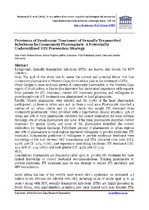Provision of syndromic treatment of sexually transmitted infections by community pharmacists: a potentially underutilized HIV prevention strategy
Date
2003Author
Ward, Kim
Butler, Nadine
Mugabo, Pierre
Klausner, Jeffrey
Mcfarland, Willi
Chen, Sanny
Schwarcz, Sandra
Metadata
Show full item recordAbstract
Background: Sexually transmitted infections (STIs) are known risk factors for HIV infection. Goal: The goal of this study was to assess the current and potential future role that community pharmacists in Western Cape, South Africa play in the treatment of STIs. Study Design: A cross-sectional survey of community pharmacists in the Western Cape region of South Africa. A face-to-face interview that ascertained experience with requests from patients for STI treatment, current STI treatment practices, and willingness to provide syndromic STI treatment was administered to head pharmacists.
Results: Ninety pharmacies were selected and 85 (94%) of the head pharmacists participated; 55 from an urban area and 30 from a rural area. Pharmacists reported a median of 40 urban clients and 25 rural clients who sought STI treatment from community pharmacists. When provided with a hypothetical clinical situation, 13% of urban and 17% of rural pharmacists identified the correct medication for male urethral
discharge, 8% of urban pharmacists and none of the rural pharmacists identified correct treatment for genital ulcers, and none of the pharmacists identified the correct medication for vaginal discharge. Fifty-three percent of pharmacists in urban regions and 47% of pharmacists in rural regions expressed willingness to provide syndromic
STI treatment. Independent predictors of willingness to provide syndromic treatment were knowledge of the link between HIV transmission and STIs (adjusted odds ratio [OR]: 13.78; 95% CI: 2.69,70.66), past experience prescribing syndromic STI treatment (OR: 11.1; 95% CI: 1.14, 108.6), and male gender (OR: 4.38; 95% CI: 1.15,
16.7). Conclusions: Pharmacists are frequently called upon to provide STI treatment but have limited knowledge of correct treatment recommendations. Training pharmacists to provide syndromic STI treatment may be one strategy to reduce STI morbidity and HIV
transmission.

